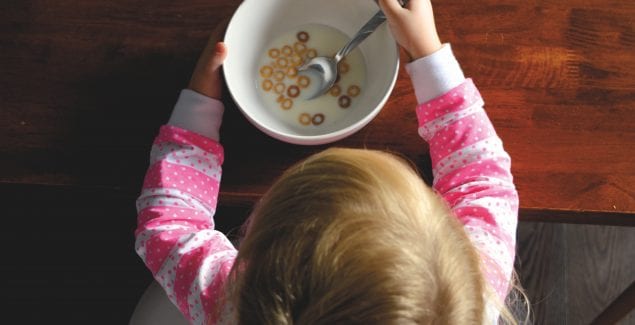Nutrition and Mental Health: It’s More Complicated Than You Think

Posted in: Parenting Concerns, You & Your Family
Topics: Healthy Living, Mental Illness + Psychiatric Disorders
The fact that March is National Nutrition Month makes me think of rats.
To be more specific, I think of two particular rats that lived in my first-grade classroom. They lived side by side, in different cages, and they were placed on teeny tables with teeny legs so that all the little first graders could “coo” and “ah” at the wonderful, shiny, white creatures with their blood-red eyes.
But soon those rats started to change.
One rat got even more shiny and healthy. He was like a Saturday morning cartoon-hero rat. He was strong, and happy, and he could run on his wheel for what seemed like all day. The other rat, however, looked increasingly terrible. This second rat ended up with matted and greasy fur, and rapidly blinking eyes, and little twitch-like jerks of his legs and neck. He got fatter and fatter, sitting in a pile of his own waste, and staring at nothing in particular. The happy rat – the one who lived right next to this sorry creature – would stare at the kids in the class with genuine affection. The rat with problems had nothing but misery. He looked pathetic, even when he was asleep.
Carbs, Fats, and Biology
It turns out we were running an experiment. The first got only good and wholesome rat food. I remember my teacher saying that for this experiment to work we could never give this rat even a single special rat treat. Only the healthiest of foods for this superb specimen would work. The second rat? He got nothing but junk food. I recall lots of Cheetos in that cage, mixed with cookies, frosting, potato chips, and fried pork rinds. (Yep. Fried pig rinds are a real thing. If you recall, it was reportedly George H.W. Bush’s favorite snack food.)
The experiment we did with these rats is shocking to me for three reasons:
- First, it seems just down-right cruel.
- Second, it was done all over the nation in the early 1970’s.
- And third, it didn’t change our eating habits at all.
I think we sat there with the little bag of Cheetos that our moms had packed for us for our school lunches while we watched that poor super-sized rat twitch and jive in obvious misery. In other words, the experiment designed to get us to appreciate the importance of eating well and to adopt healthful eating habits did neither. What mattered most, with regard to what we ate, was what our parents fed us.
I’ve done some digging to try and find references to these experiments. I found this document detailing the importance of good eating habits, published by the Department of School Nurses from the National Education Association, but I can find no mention of the rats. But when I broadened my research outside of those snooty academic search engines and used good old fashioned “Google,” I discovered some fairly consistent findings.
- Rats like junk food as much as we do.
- Rats will often choose junk food over healthy foods when given the choice.
- After exposure to a lot of junk good, rats will choose eating nothing over eating healthy rat food.
Mama rats, therefore, beware. Rats, like humans, have evolved to grab body-warming fats and metabolism-enhancing sugars whenever they can. For the vast majority of the existence of both species, it was never clear when the next junk-like food might come around. In other words, “bad-for-you” foods haven’t really been “junk” food for most of mammalian history.
A rarely encountered source of high-yield food isn’t “junk” when it’s barely ever available. In ancient times, that kind of food was considered a treasure. This is exactly what our brains say when our brains encounter the unhealthiest of foods. Our brains say, “eat that junk now or lose it forever.” That’s why it feels so special to eat junky food. We even get a dopamine reward. It’s as if there will never, ever be another Twinkie. Just ask Woody Harrelson’s character in Zombieland, and, if you will, pardon his cursing.
A zombie apocalypse coupled with an impeding junk-food shortage tends to promote some foul language.
My point here is that we can tell our kids all we want that they ought to consume healthier foods, but at the end of the day, humans are for evolutionary reasons more likely to gravitate towards carbohydrates and fats. There’s at least a few thousand years of adaptive behavior driving us towards “bad” foods. Raw sugar was once so rare that most archeological skulls demonstrate very little tooth decay. Before the discovery of sugar cane or sugar beets, the only real source of that wonderful sugar buzz was honey from the bees, and those bees weren’t all that busy during the winter months. We evolved to want and to crave and to be rewarded for pure sugar as often as possible.
What’s the Impact on Emotional Well-being?
This bit of evolutionary tinkering is one of the biggest Achilles’ heels in our generally food-abundant society. As it did for that poor rat, these cravings can cause a lot of misery. Because this is a mental health blog post, let’s consider the general emotional well-being of that junk-food-fed rodent. He most likely felt tired, unfocused, anxious, and depressed.
We know that unhealthy diets are intricately tied to poor mental health, and this might especially be the case for children and adolescents. Less-than-nutritious food consumption has been linked to
- depression
- PTSD
- riskier decision-making, and
- overall sadness.
The same kinds of conclusions can be drawn from studies looking at overall food deprivation. Starvation and undernourishment are extremely harmful to emotional well-being. These nutritionally deprived states are associated with diminished cognitive capacities, vitamin deficiencies that lead to heightened psychiatric vulnerability, and prenatal malnutrition affecting the brain development of both unborn and born children. Additionally, researchers have found that an absence of food security in the United States correlates with a very high degree of child and adolescent psychiatric sufferings. This line of research defines “food security” as any situation wherein members of a given household can expect enough nutrition to maintain a healthy life-style. In 2004, it was estimated that roughly 14% of Americans suffered from food insecurity.
In other words, this nutrition stuff gets complicated:
- Eat too much food, and it’s not good for your mental health.
- Starve, and it’s not good for your mental health.
- Eat an unbalanced diet, and you’ll feel like that poor rat in my first-grade classroom.
And, to confuse matters more, it turns out that healthier diets in kids are potentially associated with more authoritarian parenting styles, but, authoritarian parenting styles are more associated with childhood depression and pathological aggression.
Finally, we need to stress that many of these findings are correlations and not definitive causes. Does a lousy diet make you more depressed, or is it that being depressed make you more likely to eat a lousy diet? Indeed, we have evidence that depressed kids eat more carbohydrate-laden foods.
So what’s the take home? Per usual, it’s the middle ground. Which brings us back to those poor rats in my first-grade classroom: They were trapped, one next to the other, at the extreme poles of nutritional options.
Don’t put this article down and think that you can never, ever again have another Twinkie. There’s evidence that occasionally eating unhealthy food is good for your mood. But don’t have tons of junk food and nothing else either. A snack, tempered and balanced with both good-for-you foods and good-feeling foods is most likely the best route, and the same goes for your meals. Probably the biggest difference we could make on a public health level would be to ensure that all families have enough good food to eat in the first place.
At the end of the day, we might be what we eat, or we might eat what we are, but it doesn’t really matter which direction you take that equation. Eat well in moderation (as Aristotle taught us), and you’ll feel well more often. That’s the best decision for today’s menu.
Was this post helpful?
Newsletter
Subscribe Today
Your monthly dose of the latest mental health tips and advice from the expert team at The Clay Center.
SubscribeMultimedia
Quick Jumps
Tag Cloud
-
addiction
ADHD
adolescents
anorexia
anxiety
autism
behavior
CBT
child development
children
college
communication
covid-19
depression
digital media
dyslexia
eating disorder
evaluation
family
fear
healthy development
learning
learning disabilities
learning disability
mental health
mental illness
parenting
parents
Podcast
PTSD
relationships
resilience
school
shrinking it down
social media
stigma
stress
suicide
technology
teenagers
teens
therapy
trauma
treatment
violence

 Share
Share Tweet
Tweet





